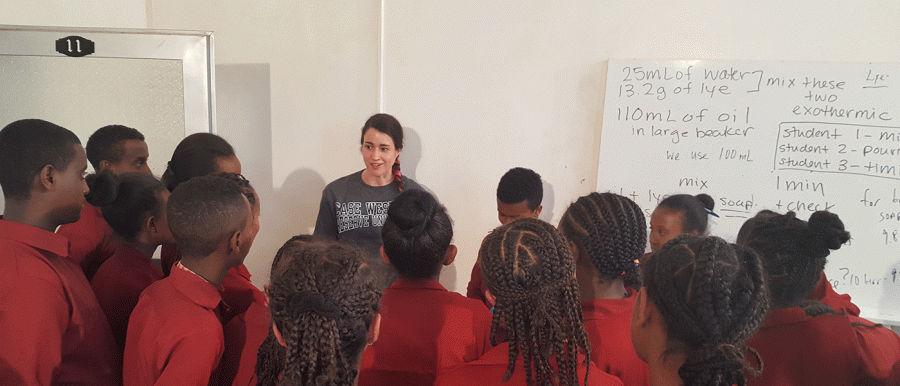CWRU graduate fellows to develop infrastructure in Ethiopia
Blaire Vorbers, a 2012 alumna, teaches students in Ethiopia.
April 12, 2019
Graduate fellows at Case Western Reserve University have partnered with the Gelfand Global STEMPower Initiative to help cultivate economic development through creating engineering infrastructure, with a special focus on chemical engineering, in Ethiopia. This initiative aims to grow the infrastructure necessary to create jobs and fill economic demands through engineering innovations, using the network of 30 schools and STEM centers the Gelfand Center has built.
“The Case School of Engineering was chosen as the United States partner for this project due to our strengths in innovative engineering education and global engagement, and the vision and passion we share with Mark Gelfand to make the world a better place through science and engineering education,” said Dan Lacks, project lead and the chair of the Department of Chemical and Biomolecular Engineering.
Currently, the standard curriculum in the Ethiopian education system does not address practical applications of the science being taught in classrooms, leading to deficits in the creation of value-added products, or products that increase in value after production.
This project brings CWRU graduate fellows together with Ethiopian students in the creation and implementation of hands-on scientific applications.
Blaire Volbers, a 2012 alumna and inaugural Gelfand graduate fellow, said, “It is our hope to add this component into the curricula and in turn help create a generation of engineers that could harness the raw materials available in Ethiopia to create more jobs, better stimulate the economy and further advance the country.”
The project is based on the idea that engineering is a means of adding value, with one of the activities consisting of making soap from vegetable oil.
“We are all excited about this initiative because it’s not just changing the lives of the students in Ethiopia,” Lacks said, “but also changing the lives in the CWRU students who will be the Gelfand Global Fellows.”
Ultimately, the program hopes to motivate the youth of Ethiopia to stimulate the economy of their country by mobilizing their raw, natural resources.
Volbers explained that the scope of the project has not been fully realized and will likely make exciting potential opportunities in the future.


